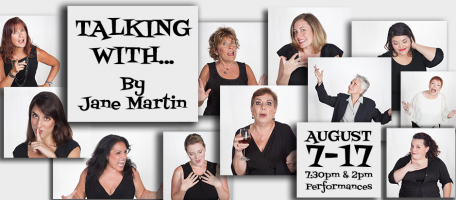
Though the eleven women of Talking With mostly talk at us, their differing stories match differing persons who draw us in. Ostensibly feminist, the monologists are, in the main, not admirable. Nor do they achieve their potential to the fullest. But we’ve got to applaud them for trying.
“Fifteen Minutes” has Lynne Doyle as an aging Elaine Stritch-type of actress. She’d like to know her audience as they do her from program biographies. She’s tough enough to get to us under turned-up house lights. We wonder, then, will she go on? No spoiler here!
“Scraps” of colorful cloth adorn the costumes that a housewife wears. She pretends to be her favorite Oz book characters when hubby’s at work and she vacuums, etc., at home. Tammy Halsted enthuses, but the script makes her musings go on too long and bouncingly, diluting their effectiveness.
“Clear Glass Marbles” in a bowl near a daughter (compelling Alana Opie) recall that her mom used all 90 to mark the last days of her life. What she did -- for instance, sending goodbye notes to 80 or 90 friends -- is lovingly recalled. We, like her daughter, feel her loss in this most poignant episode.
“Audition” brings on Amanda Helsey in an unpleasant role of an unpleasant actress trying out for a part. At first, she had seemed pitiable by even forgetting her name. Did Director Tim Fitzgerald mean for her to turn out so mean? As she actually threatens us, we’re made to act as judges. I couldn’t have cared less about her, though I think Jane Martin wanted me to.
“Rodeo” has rider Debbi White telling how rodeo shows have gone from genuine, family things to Disneyfied commercial ventures. White is one of the more genuine-seeming monologists in the program, though the fact that she all but bursts out of her shirt and jeans zipper is disconcerting.
“Twirler” played by Lauren Ward seems all surface. Intentionally. She’s a religious nut who identifies her religious experience with her baton. She imposes it on an audience member at one point. Nice or naughty act? Mystifying? Do we care?
“Lamps” go from one side of the stage to the other. All work as they’re turned on. Also true of Sandra Musicante. She convincingly plays a woman who feels lamplights change her surroundings, feelings toward people she remembers, present moods. This sketch is the most subtle and best conceived.
“Handler” brings on an intrepid Noella Altamirano as an evangelical who uses snakes in her family’s religious ceremonies. The skit is disagreeable as the experience of the handler seems to be, as she questions the existence of God. But she does believe “you can’t fool a snake” and is thus uneasy. Does the snake make an appearance? Do we want to find out?
“Dragons” shows a mother (played on a continual excruciating high by Kelly Turner) in labor. She expects a deformed child. Turner makes her anguish real, but Director Fitzgerald might have done better to require it happening gradually instead of constantly. Nothing’s particularly great about the writing of this scene, which drags in religion to no special or sustained effect.
“French Fries” is comical, but the comedy seriously comments on societal ills. The homeless heroine, wonderfully embodied in a twinkling-eyed Betty Robinson, would love to live in McDonald’s. She’s in her local one from opening to close, where she revels in a bit of attention from the “cute kids” and a guy who seems to be a manager. Though she witnessed a horrid death, it happened to someone who left because “nobody dies in McDonald’s,” but the plastic containers for drinks will last for an eternity outside. I observed the skit as an audience favorite; I don’t disagree. “Marks” has Leona Collesano showing off tattooes. Her story is sad. She was once cut by a man who punished her by cutting her face for resisting his sexual advances. Tattooes now mark other people who’ve marked her in some way during her life. Not all the people are as bad as the sound system that detracts from Collesano’s brave speech. I find this sketch to be more “written” than meant to be played simply. Perhaps its final position in the series of sketches is appropriate because that quality of performance rather than genuine talking of real experiences seems to characterize Talking With.
The program gives no credit to the props manager, who is a major contributor to the staging. Everything from a bowl of marbles being dropped to a vacuum cleaner working to a line-up of various lamps standing or on tables is not only appropriately chosen but effectively used to substitute for standing or changing scenery. Good projections (including a tantalizing pic of french fries) are similarly unacknowledged, so I want to do so here. Director Tim Fitzgerald is also to be commended for swift scene changes, including essential lighting and blocking for each actress's entrances.
